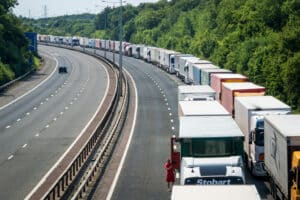Brexit red tape has damaged Britain’s trade with the EU and the situation could worsen unless the government works with Brussels to reduce hold-ups at UK ports, parliament’s spending watchdog has said.
Only hours after Jacob Rees-Mogg was appointed minister for Brexit opportunities, a report by the cross-party public accounts committee (PAC) said border checks in place since the beginning of the year had increased business costs and “suppressed” trade with the EU.
The PAC said there was a risk that the situation would worsen in September, when stricter checks are implemented by the EU and a forecast post-Covid recovery in global trade increases traffic through UK ports.
Urging ministers to upgrade port systems and infrastructure, especially at Dover, the committee’s chair, Meg Hillier, said it had “repeatedly raised concerns about the impact of changes to trading arrangements on businesses of all sizes, and we remain concerned”.
The warning came after a haulage industry boss said lorry drivers may have to get used to queueing for four hours at Dover on busy days. Mile-long queues of HGVs waiting to get into the crucial trade port have been a regular sight in the first weeks of 2022.
Measures that force lorries to stop on the A20 to prevent Dover from becoming clogged have been implemented 20 times already this year, compared with 69 times in the whole of 2021.
Rod McKenzie, executive director for policy and public affairs for the Road Haulage Association, said post-Brexit border checks “mean friction where none existed” and hauliers were becoming familiar with long delays at peak times.
Under the terms of the Brexit deal negotiated by Boris Johnson in December 2020, the EU introduced full import controls in January 2022 after a yearlong transition period. The UK government intended to do the same, but has delayed three times over the last year and the PAC report said officials could not give a “complete assurance that it would not do so again”.
“Much remains to be done to introduce import controls, and in particular to ensure that traders and hauliers across the 27 EU member states are ready as the controls are phased in,” the report added.
As part of the upgrade, the UK must adapt port equipment and border checks by September to avoid huge disruption to holidaymakers and haulage firms when the EU switches to biometric identity checks that would force travellers to exit their vehicles.
Hillier said the government claimed it would develop “the most effective border in the world” by 2025, which she described as a “noteworthy ambition”, but “it is optimistic, given where things stand today”.
She added: “One of the great promises of Brexit was freeing British businesses to give them the headroom to maximise their productivity and contribution to the economy – even more desperately needed now on the long road to recovery from the pandemic. Yet the only detectable impact so far is increased costs, paperwork and border delays.
“The PAC has repeatedly reported on Brexit preparedness and at every step there have been delays to promised deadlines. It’s time the government was honest about the problems rather than overpromising.”
Home Office officials are in talks with the French authorities about how to operate the new controls without causing queues, but the report described them as “at an early stage”.
Forecasts of the costs to businesses are expected to be lowered, though it is not clear by how much, the report said.
In 2019, HMRC estimated that complying with new customs rules could cost UK and EU businesses £15bn a year. “HMRC told us in November that it had not updated its 2019 estimate, but that there are indications that the costs to businesses will be less than that estimate,” the report said.
The government said it was continuing to engage with EU partners to ensure that border arrangements work.























0 Comments